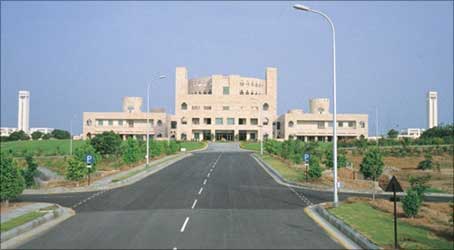
Can factory workers afford to buy houses? How to interest banks to lend to them? Can a migrant worker use the money he pays as rent to buy a house? How to build low-cost houses without any compromise on the quality?
These are issues under discussion not in government but at the Centre for Emerging Market Solutions at the Indian School of Business in Hyderabad. The Centre is working with three real estate developers to come up with a viable business model for low-cost houses.
Once the nuts and bolts are in place, it can be transported to other emerging markets. "It is wave 3.0 of globalisation," says ISB Dean Ajit Rangnekar with an air of confidence.
It is early to say if ISB will be able to perfect the model. The list of ponderables is long: How to get land cheap, how to turn workers into bankable risks, how to bundle common services into such apartments and so on.
But it is essential for ISB to come out with a workable model around the proposition of affordable housing because emerging market competencies are what could differentiate ISB from the other international business schools of repute in the days to come. This is a spot no other business school occupies at present, and ISB wants to get there before anybody else. ...

ISB has always positioned itself as an international business school. The Financial Times recently ranked it 12th in its list of the world's top business schools, up from 15th a year ago and 20th two years ago.
The GMAT (Graduate Management Aptitude Test) score, which is used for admissions by leading business schools across the world, for ISB is now in the range of 710 to 720 - comparable with the best anywhere.
But its intake of international students is small - the basic criterion for being an international business school. Of the 571 students in the class of 2010, only five per cent have come from abroad. If non-resident Indians and people of Indian origin are included, then the figure is 20 per cent. ISB wants the number to be higher.
Also, almost all foreign students are from either Europe or the United States; ISB would be happier with some faces from emerging Asian economies. The differentiator is therefore vital.
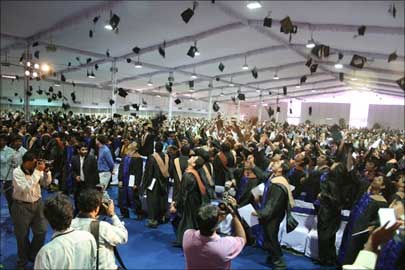
Different strokes
ISB has from day one tried to project itself as different from other business schools in India, including the state-owned Indian Institutes of Management (IIMs). To begin with, it offers a one-year course for men and women with work experience.Fresh graduates cannot apply. The IIMs offer a two-year course, though they too have now started a one-year course. Two, like international business schools, it goes by what aspirants score in GMAT and not CAT (Common Admission Test) used by the IIMs and MAT (Management Aptitude Test) used by other Indian business schools (on last count, there were close to 1,500 in the country).
This cuts the other way too, though. A Hyderabad-based businessman, who recruits from ISB as well as IIMs, says he finds the analytical skills of IIM students better because CAT focuses on that. Three, ISB has refused to register with the All India Council for Technical Education.
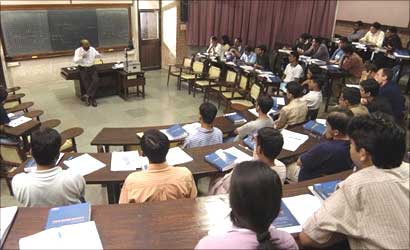
This has given it the freedom to have its own curriculum, offer teachers global salary scales and charge students higher fees: The one-year course at ISB costs Rs 20 lakh; the two-year course at IIMs cost a lot less - Rs 7 lakh for IIM Kozhikode to Rs 12.5 lakh for IIM Ahmedabad.
Though AICTE, on the flip side, has refused to recognise its degree, employers don't seem too bothered and ISB students are in high demand. This autonomy, most observers say, has helped ISB nurture its brand image better than the IIMs which believe that their output should talk for the quality of their education. Placement salaries at ISB and IIMs are not comparable because ISB students come with some work experience.
The autonomy has also helped ISB put together a large army of visiting faculty: While the permanent faculty is 40, the visiting professors are close to 100 in number. So, for every 14 students, there is one permanent faculty.
In the world of business schools, three visiting professors are considered the equal of one permanent faculty. So, if the visiting faculty is taken into account, the ratio improves to around eight.
"The norm elsewhere is 1:15; and 1:10 is a luxury," says ISB Deputy Dean Savita Mahajan. The visiting faculty is drawn from the three associate business schools of ISB - Kellogg, Wharton and London Business School - as well as other business schools.
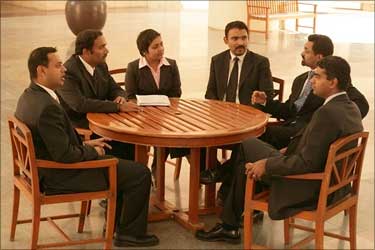
Apart from faculty, what makes a business school stand out is the research it carries out. (Infrastructure is now considered a commodity that can be bought off the rack.) Of the 40 faculty members, no less than 35 are full-time into research.
Most of them have been picked from business schools in the West; they are required to teach for not more than 80 hours in a year, and need to publish four to five articles in international management journals of repute before they are confirmed.
They are expected to do so in six years, though one of them recently achieved the target in five years. What nags here is the spat with AICTE, because of which ISB cannot offer doctoral courses in management. Until this problem is fixed, ISB will not be able to benchmark itself with the best.
ISB has grown at a fast clip ever since it was set up in 2001. According to Mahajan, it has grown 30 per cent per annum in the last few years in terms of revenue turnover, student strength as well as executive education.
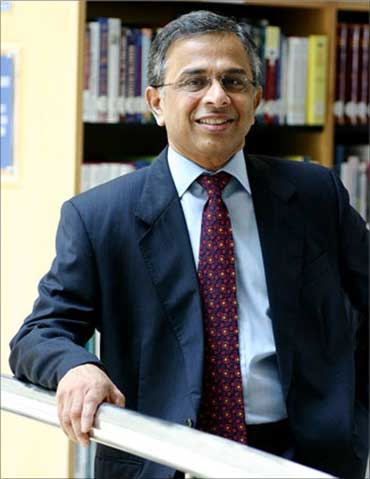
ISB, a not-for-profit company, has reached an annual turnover of close to Rs 100 crore (Rs 1 billion) in nine years. Next on the cards is a campus at Mohali near Chandigarh, which will be up and running by 2012.
The capital outlay of Rs 200 crore (Rs 2 billion) has been contributed equally by four Delhi-based businessmen: Analjit Singh of Max India, Atul Punj of Punj Lloyd, Sunil Kant Munjal of the Hero Group, and Sunil Mittal of Bharti Airtel.
One reason for ISB's aggression is that it is steered by its 33-member executive board, which includes its 18 or so founders. Two, some of the top functionaries - Rangnekar, Mahajan and Deepak Chandra (also Deputy Dean) - are not academics who are known to be conservative when it comes to chasing growth.
While Rangnekar joined ISB from PricewaterhouseCoopers in 2003, Mahajan has worked with Maruti Suzuki, Karvy and Intergraph, and Chandra ran his own consultancy outfit. Observers wonder how long academics can be kept from running the business school.
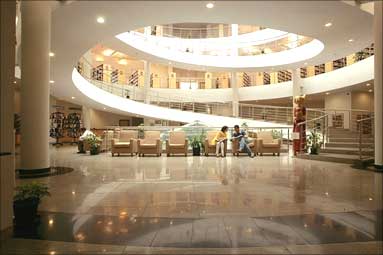
Global dreams
Some rival Indian business schools say ISB is yet to join the global league. "I wouldn't say it's an international business school but it does have an international flavour," says Great Lakes Management Institute Executive Director S Sriram. But what Rangnekar has in mind is global leadership.
"We want to be amongst the best in the world," says he. The 12th rank on the Financial Times takes ISB closer to that dream. (There are two popular lists in the world - one by the US News and the other by the Financial Times. Since the US News list tends to focus more on business schools in the US, ISB has decided to participate in the list compiled by the Financial Times.)
The Financial Times gives 51 per cent weight to the performance of students who passed out three years ago - how have their salaries and job profiles improved - and 49 per cent to other factors like research output, publication of articles in top-notch journals and so on. As most of its students work in India, ISB has a distinct advantage: From a slow base, salaries in India are rising faster than in mature economies.
Chandra admits this could be one factor that helped in the Financial Times ranking. Surveys carried out by ISB suggest that its one-year course helps people at least double their salaries.
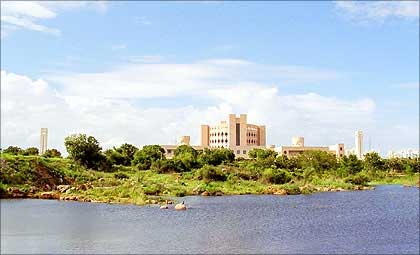
Rangnekar, on his part, insists that ISB is not obsessed with rankings. "Top salaries offered at the campus make the worst advertisement for an educational institution. Ranking is the next level," says he. What, Rangnekar believes, will make ISB stand taller than others is its competencies in issues faced by emerging markets like India.
"Apart from knowledge creation and dissemination, what matters is knowledge implementation," adds Rangnekar. "We are very much a part of India. Our focus has to be on emerging markets. We need to make the poor the driving force of the economy.
The focus is on business models that are impact-oriented and come with good market returns. These are transformational projects."
After looking at sectors like housing, healthcare, energy, water and environment, ISB decided to focus on the first two because, says Rangnekar, "business models work fastest here".
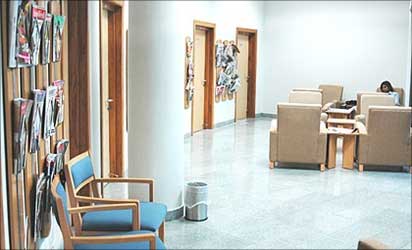
The affordable housing project of a researcher is supported and incubated by the Centre for Emerging Market Solutions. The aim of this start-up is to provide homes for the sub-Rs 5,00,000 market, while giving its investors proper market returns.
The start-up has raised its first round of capital from commercial investors and has invested in three projects across the country including the National Capital Region.
It aims to create self-sustaining townships of between 4,000 and 10,000 inhabitants, keeping in mind the unique social needs of the average Indian family. "Many low-cost housing attempts in the past have not succeeded because of a mismatch with lenders who perceive it as high risk and hence expect abnormal interest rates, which makes the project unviable," says Rangnekar.
"Our approach has been innovative in virtually the entire value chain, from equity financing to end-user mortgage financing, collaborating with a number of national and international companies to developing affordable solutions in construction technology, and the much-needed vocational training in the construction industry."
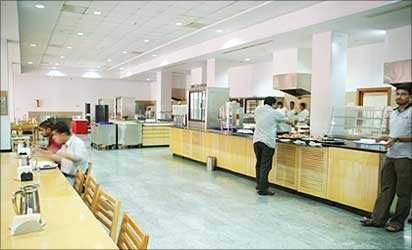
Next could be healthcare delivery. At the moment, the Centre is studying various models of ambulance services and insurance on how to reach consumers at the bottom of the value pyramid.
This includes an ambulance service which comes for free if the patient reaches a government hospital but charges an amount if it is used to get to a private hospital. It has also started to work with Biocon, the Bangalore-based biotechnology specialist, for affordable innovation.
This, in a way, also addresses the criticism often leveled at ISB that it serves the needs of consultancies and investments banks alone, and is not of much relevance for run-of-the-mill Indian companies.
"ISB gives very good education and meets a certain need, but it is not of much relevance for an organisation like us," says Godrej Industries executive director Visty Banaji. LG India chief operating officer Yasho Verma says India's largest consumer electronics company hasn't gone to ISB for recruitment because "it found it too elitist".
Resources bank ISB last year set up the Centre for Case Writing. There is a huge shortage of emerging market case studies. The Centre aims to fill this gap. In fact, ISB has cast the net wide. It is willing to collaborate with any Indian business school in this effort, the intellectual property however will be owned by ISB.
To ensure good quality, any case study from outside will have to be co-authored by a member of the ISB faculty. It has tied up with Ivey School of Business, Canada, to distribute these case studies.
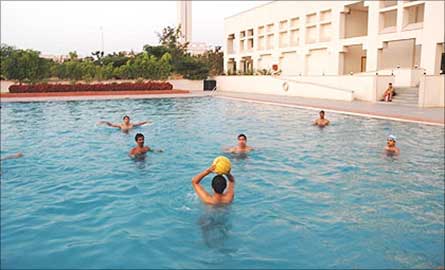
Harvard is the largest distributor of case studies and accounts for up to 80 per cent of the volumes. Ivey comes next after Harvard. According to Mahajan, about a dozen Indian case studies have already been done and another 40 or so are in the pipeline.
In the field of executive education, which accounts for almost 40 per cent of ISB's annual revenue now, it offers customised courses for Indian companies. This has helped it get a lot of business that was otherwise going abroad.
Business schools like Harvard have begun to offer courses in India but these are not customised.
"As an Indian group, it makes a lot of sense for us to send our people to Hyderabad," says Essar Group President (human resources) Adil Malia. According to Mahajan, executive education cross-subsidises the one-year management programme.
Some results have already begun to trickle in. According to Chandra, there are very few takers amongst ISB students for exchanges with overseas business schools, though there is a heavy rush there for ISB.
The money charged by ISB is way below what business schools in the West ask for. In fact, in terms of fees, ISB has positioned itself between top business schools abroad and the premier business schools in the country. Thus, its courses cost almost double of IIMs but are at least 50 per cent cheaper than business schools in the West.
You could call it sound business sense. That's why many new business schools in the country have started to copy the ISB model - they go by GMAT scores and are not-for-profit companies. Chennai-based Great Lakes, for instance, followed ISB's footsteps in 2005. The new-found emerging market wisdom could help ISB build a USP.